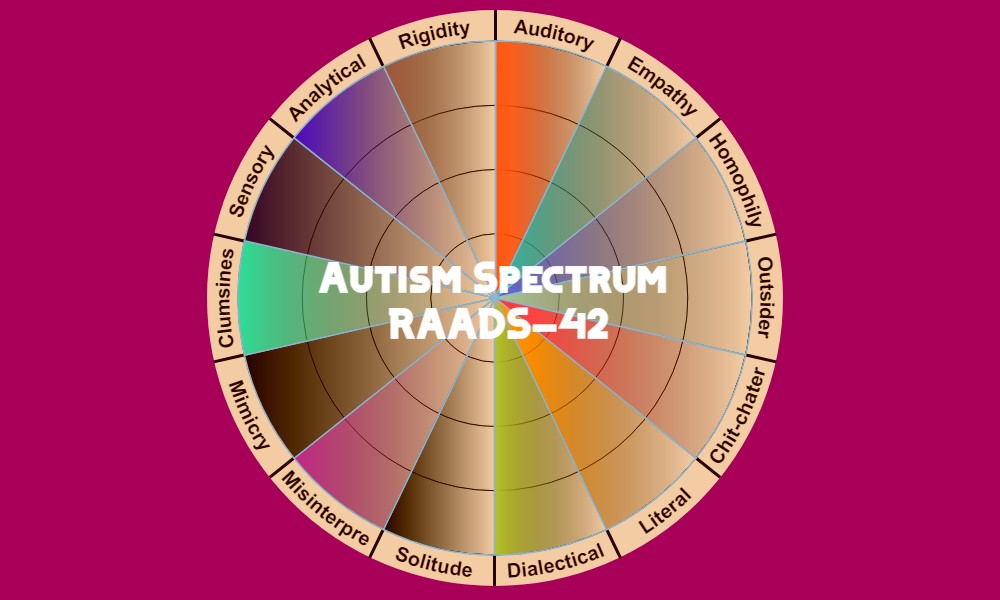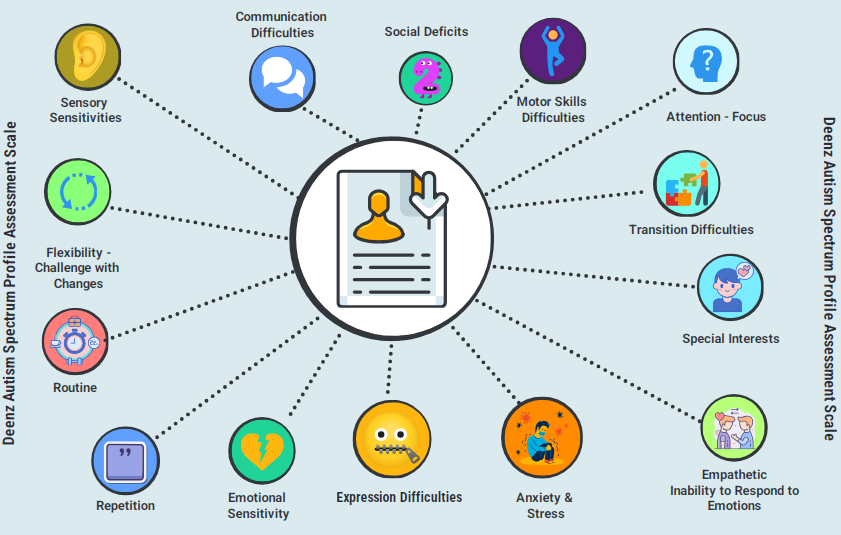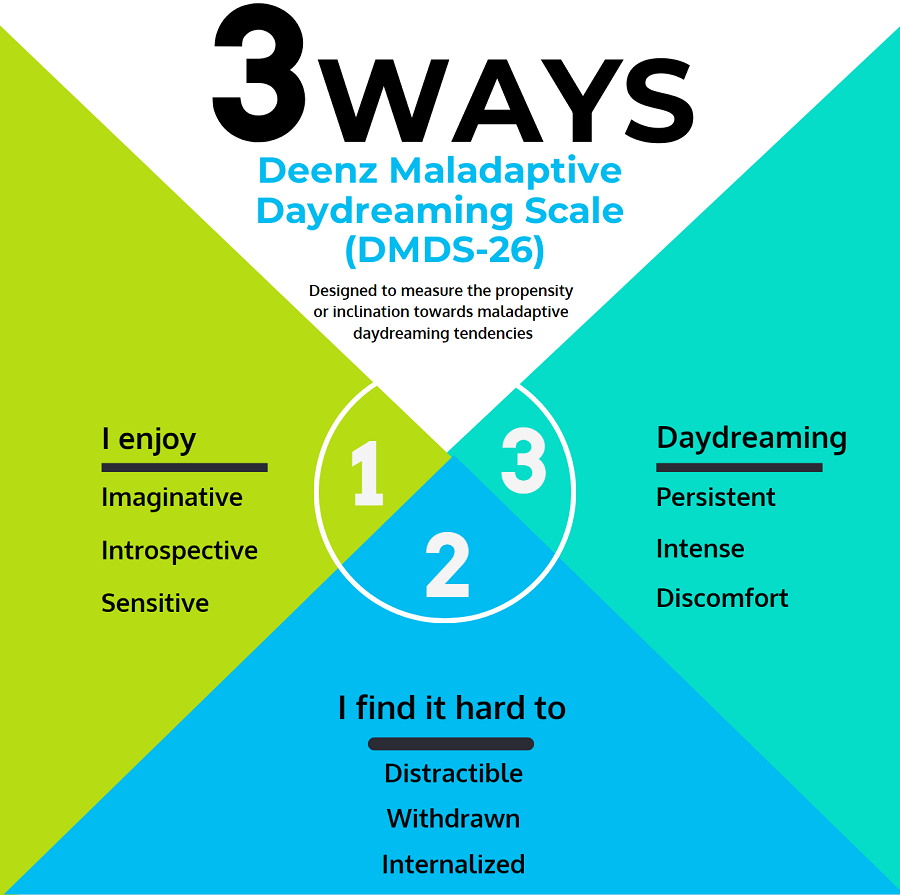Basic information | |
|---|---|
| Statements: | 32 |
| Duration: | 5–7 minutes |
| Type: | Self-assessment |
| Seminal work: | Deenz Neurodiversity Scale (DNS-32) |
| Publishing year: | 2022 |
|
Instructions: Deenz Neurodiversity Scale (DNS-32) is a self-assessment tool, designed to measure neurodiversity on a spectrum and evaluate behaviors and experiences across various subtypes, including autism spectrum disorder, attention deficit hyperactivity disorder (ADHD), dyslexia, and dyspraxia. The scale consists of 32 questions related to your experiences, behaviors and the way you interact with the world. For each statement, indicate your level of agreement. | |
This computerized version of Deenz Neurodiversity Scale (DNS-32) is based on the preliminarily version of research, development and validation of DNS-32 [1] Development and Validation of the Deenz Neurodiversity Scale (DNS-32). The information provided is solely for educational purposes. There is no age limit for participating in this self-assessment. We neither ask nor collect personal information, nor do we process or store your results, especially for research purposes. We adhere to the ethical guidelines set forth by the Institutional Review Board (IRB).
Over the years, the perspective on neurodivergence has changed significantly, modern psychology emphasizes understanding neurodivergent traits on a spectrum. [2] “Neurodivergence‐informed therapy.” Developmental Medicine & Child Neurology 65, no. 3 (2023): 310-317. Exhibiting neurodivergent traits does not necessarily mean that a person might have neurological disorder; instead, it recognizes that everyone exhibits variations in how the brain functions or processes information. [3] Neurodivergent intersubjectivity: Distinctive features of how autistic people create shared understanding. Autism. 2019 May;23(4):910-21.
Development of the Neurodivergent Self-test.
Researchers have emphasized, understanding traits associated with neurodivergence on a spectrum, and these traits may be exhibited by anyone to some extent. To measure the extent to which someone exhibits these traits, there was a recognized need for a valid and reliable instrument. [4] The dimensional structure of the Camouflaging Autistic Traits Questionnaire (CAT-Q) and predictors of camouflaging in a representative general population sample. Comprehensive Psychiatry. 2024 Jan 1;128:152434.
Deenz Neurodiversity Scale (DNS-32) the main purpose of the scale is to measure neurodivergent traits in general or non clinical population. In the study of 302 students, in which 104 were female and 199 were male, the DNS-32 proved to be accurate in measuring the traits associated with neurodivergence in various domains.
Being neurodivergent does not necessarily mean that a person has a neurological disorder. Everyone is different, and each person’s brain functions and processes information in unique ways. Also being a nerogivergent does not mean a person whose neurological functions differ from those of a typical individual, has any type of defect but it means the persons brain is functions in a different way of processing information and perceiving the world around in a different way. [5] Jurgens, A. (2020). Neurodiversity in a neurotypical world. Neurodiversity studies: A new critical paradigm, 73-88.
This self-assessment test can provide insights and can measure the traits you may be exhibiting but can not replace the official diagnosis of any psychological or neurological conditions.
References
Deen Mohd Dar. Development and Validation of the Deenz Neurodiversity Scale (DNS-32) for Assessing Neurodivergent Traits in College Students., PREPRINT (Version 1) https://doi.org/10.21203/rs.3.rs-4045412/v1 ↩
Chapman, R., & Botha, M. (2023). Neurodivergence-informed therapy. Developmental Medicine & Child Neurology, 65(3), 310-317. https://doi.org/10.1111/dmcn.15384 ↩
Heasman B, Gillespie A. Neurodivergent intersubjectivity: Distinctive features of how autistic people create shared understanding. Autism. 2019 May;23(4):910-21. https://doi.org/10.1177/1362361318785172 ↩
Ai, W., Cunningham, W. A., & Lai, M. C. (2024). The dimensional structure of the Camouflaging Autistic Traits Questionnaire (CAT-Q) and predictors of camouflaging in a representative general population sample. Comprehensive Psychiatry, 128, 152434. https://doi.org/10.1016/j.comppsych.2023.152434 ↩
Jurgens A. Neurodiversity in a neurotypical world. Neurodiversity studies: A new critical paradigm. 2020 Aug 26:73-88. Google Scholar ↩








